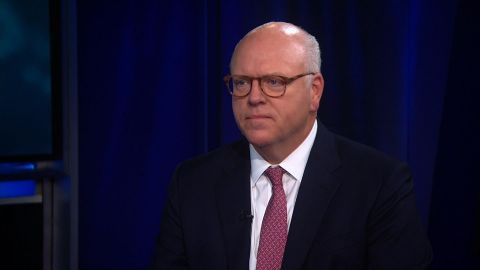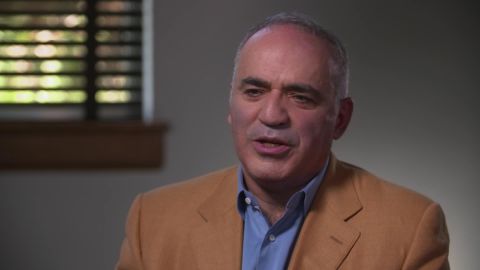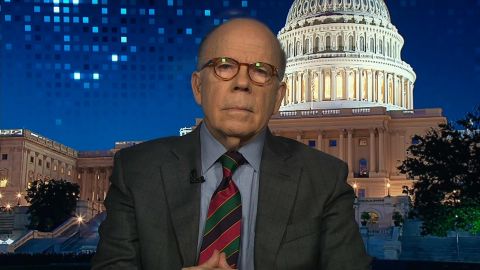Read Transcript EXPAND
MILES O’BRIEN: Garry Kasparov, thank you very much for joining us. Take us back to 1997, and a match, a quite celebrated match, between you and a machine. Going into that tournament in 1997, did you think humans still have supremacy?
GARRY KASPAROV, CHESS GRANDMASTER & ACTIVIST: Yes. Most likely. We had matches against other computers early on, so Deep Blue had a prototype called Deep Thought actually created by the guys. I played it in 1989 so beat it quite handedly. And then we already experienced troubles against some chess engines like Fritz or Deep Junior. And I think one thing we couldn’t understand at that point is that machine would always have a steady hand. So it’s not about solving the game which is mathematically impossible, the number of legal words in the game of chess. According to Claude Shannon, it’s I think 10 to the 46th power but it’s about making a few mistakes. So Deep Blue was by today’s standards, today’s chess engine standards, was not sort of a great success. And the free chess app on your mobile is probably stronger than Deep Blue. And whether you try chess engines that you can buy online and put on your laptop, I mean they are so much stronger than the current world champion, Magnus Carlsen. Again, between world champion today and chess engine, just an ordinary one that you can buy online is the same between say (inaudible).
O’BRIEN: People have looked at that moment and seen it as a pivot point. You think that’s overstating it?
KASPAROV: No, it’s a pivot point but it’s about lessons that you can draw out of this pivot point. For me, that was a revelation that started human versus machine. We should look for human plus machine cooperation. Anything that can be classified as a core system, machine will do better. If we know how to do it, machine will do it better. So whether it’s game of chess, any video game, Texas Hold Em Poker, machines will do it better. For a simple reason, not because they play perfectly. There’s no perfection to the universe. No machine will ever (inaudible), they will make a few mistakes. It’s about precision. It’s about the vigilance during the game that no humans could.
O’BRIEN: I think it’s probably accurate to say that you’re the first knowledge worker in the world who had his job replaced by machine.
KASPAROV: Again, replaced is overstatement. Threatened, endangered, challenged. Because the chess hasn’t stopped. People are still playing chess. Actually, chess is far more popular today than it used to be 25 years ago. One of the reasons, actually, computers. More people can follow chess games and while understanding what is happening. So there’s simple to have their computer or elbow. They look at the game played by the top players, the world championship match and they don’t need even commentaries. They just look at — OK, commentaries always die but they can look at their computer screen and they can know exactly what’s happening.
O’BRIEN: So are you making a larger point about technology here? I mean we always fear that technology is going to displace us in some fashion. But it doesn’t always turn out that way, does it?
KASPAROV: It never did. I mean the problem is that while those who are spreading this fear, they are ignoring the fact that many times in history, the humanity faced this kind of challenges. Many industries have been ruined, jobs lost, people got desperate. But then we move forward. And I think now it’s we simply ignore the fact that technology is the main reason why so many of us are still alive to complain about technology. Just look at the average lifespan, thanks to technology. It’s a human pride. So we always thought that our problems have skills, they will know the challenge. It’s the same story. I think eventually, it helps us to become more human, to become more creative. I mean you can see passively and waiting for technology to change your life and it could start reshaping the world around us, but you can be more proactive and look for the ways to sort of free us, to inspire our creativity and to help us to realize our grandest dreams.
O’BRIEN: So why do you think people are so fearful, in particular, the rise of the robots? There’s a certain risk aversion out there, isn’t there?
KASPAROV: Look, I think it’s because people today are just afraid about the future. So we’re no longer looking in the future with optimism. So it’s not like 50 years ago where we’d really get out, space travel about helpful androids. Today, the future is in the shadow. And people are not sure because we had comfortable lives, we still have comfortable life, and people are afraid to lose what they have today. So they’re no longer willing to take a risk. So I think it’s more about our attitude towards risk, toward, innovation, towards future that donates to this (inaudible).
O’BRIEN: How do you get that back though, that confidence of the future, that ability to really think big thoughts and dream big dreams?
KASPAROV: Look, unfortunately, whether you look at the past, all the sort of the most effective way of moving things forward, it’s out of question now. So that’s why we have to find way — means and ways of training this mentality by, you know, without such radical endeavor.
O’BRIEN: So you can make an argument we’re in a war right now, a cyberwar? Do you go along with that?
KASPAROV: Again, let’s be more specific. Cyberwar against?
O’BRIEN: Well, I think you can make the argument that certainly Russia.
KASPAROV: Yes, agreed. China.
O’BRIEN: As China —
KASPAROV: China.
O’BRIEN: — have tried to interfere in U.S. elections and just tried to reap chaos and confusion and —
KASPAROV: That’s more Russia. China is more strategic. So this is —
O’BRIEN: Walk me through. So first, let’s talk about Russian disinformation and how that plays into the chaos we’re living in right now.
KASPAROV: Yes, but we should look at the bigger picture.
O’BRIEN: OK.
KASPAROV: So where was a conflict between free and unfree world. It’s not so obvious as during Cold War because we don’t have brown wall that physically divides the two walls. But it’s even more challenging. And it’s quite ironic, it’s an irony that technology that has been conceived and invented in the free world has been effectively used by the enemies of the free world to undermine the foundation of the free world. And China and Russia, they both are using this technology but different purposes. So as a chess player, I always say separate tactics and strategy. So China is a long-term strategic threat. China steals information, steals technology but it’s all about long game. So as the Chinese — (inaudible) Russia. Chinese always thought (inaudible) Russian leadership (inaudible). So that’s the difference. Putin doesn’t care about long-term future because Russia is a one-man dictatorship and it’s all about political survival of him. So what happens after him, doesn’t matter. And it’s all about tactical advantages. So how can we use this event to spread chaos. Chaos is very important for a dictator. Because during chaos, he can be most effective. Now, cyberwar, it’s a very smart attempt of KGB to undermine the democracy. It’s a war. It’s not a cyberwar, it’s a new version of the Cold War. That’s why for those who say we don’t want a new Cold War,it’s not about you to stop it if the war was declared. And the main idea behind the war is to destroy the fabric of the sort of society. And Putin actually — it’s Putin’s regime started to build troll factories and fake news industry all way back in 2004, 2005. They made smart decision not to fight Russian opposition on the Internet so building a wall and the firewall and just forget about it but exactly the opposite. So they realized that you can cut people from information or you can flood them with information and could even be more effective. Because by doing, you can exhaust critical thinking. You can alleviate the very concept of truce. Truce is not noble. So because I lied, the 10 different versions of lie and how can you find one which is true. And it worked in Russia, it worked in neighboring countries with strong Russian speaking communities. It then moved to Europe. And in 2015, I predicted that they would do it in America. Actually, I call the Facebook model is like (inaudible) Russian bear.
O’BRIEN: How big a threat is Vladimir Putin to liberal democracy everywhere? And what, in your view, is the way to counter that threat?
KASPAROV: It’s existential. It’s existential and unfortunately, the free world still doesn’t want to recognize it. Putin succeeded in basically destroying the world order that worked so well after World War II. Annexation of Crimea was just a blatant challenge to the concept that the borders must be respected and the price he paid, nothing. And all these sanctions, it’s meager compared to the political benefits that he gave at home and abroad. And while Europeans still in theory or just on paper, they are supporting sanctions. And Russia economy, probably suffering but you look at the bigger picture, Germany has doubled the amount of gas it’s buying since 2014 annexation of Crimea. During last year, the Russian French Trade grew up 11 percent. Trump is here in America. Europe is in chaos, you have Brexit and basically that’s have Britain from the world politics because they can’t solve this domestic issues. You have the rise — all the way Europe, you have the rise of the far — alt-right far right parties. All of them are arguing for lifting sanctions and just embracing Russia. And, again, he’s not paying prices for what he did and what he’s doing now. And he doesn’t that feel he can be contained. And that’s a big danger because we know from history, dictator eventually crosses all the red lines. And at one point, he has to be met by the decisive response. And one thing from his — one rule of history, every delay of responding to this threat of a dictator pushes the price up.
O’BRIEN: You called it an existential threat.
KASPAROV: It is.
O’BRIEN: And yet people are apathetic and tuned out. Why the disconnect?
KASPAROV: Because this threat is very different. Because it’s — if somebody wants to shoot you and you can see the point gun so you understand the threat. That’s the Cold Ward, Berlin Wall. This separates us from them. This threat is you don’t feel it. It’s just killing you, just basically poisoning you just day by day so by small, small portions. And it’s — look, if you compare situation in America with 20 years ago, it’s different. The country is almost in the verge of Cold Civil War. I mean the latest CNN polls demonstrate that Democrats and Republicans, they don’t talk to each other. And many of them view the opposite side as enemies. Big successful Donald Trump, big successful Vladimir Putin.
O’BRIEN: You said you believed Trump is a Putin asset.
KASPAROV: Yes, I do.
O’BRIEN: What do you mean by that?
KASPAROV: That’s exactly what I mean.
O’BRIEN: On winning or winning?
KASPAROV: I don’t think it matters. We’ll find it out. But I don’t know what Trump thinks about it but I met enough KGB in my life and I can tell you the way Putin looks at Trump is very different than the way Putin looks at other foreign leaders. Typically, he looks at them with contempt because he (inaudible). To Trump, he looks like the KGB operative, looks at his eyes. And by the way, if Trump were not a Putin asset, what would he do different? Just look at every decision Trump made related to Russia. And it’s — if he were not an asset, I don’t know what else. You can imagine that the president could have done to make Putin not just happy but more powerful than he used to be.
O’BRIEN: In the context of all of this, is it right, is it appropriate, is Congress, the democrats in Congress doing the right thing pursuing impeachment?
KASPAROV: They are doing absolutely the right thing. And I hope they will narrow it because you cannot have too many articles for impeachment. It makes easier for defense. This help Republicans and Trump to Trump’s lawyers to destroy by spreading chaos. Again, it’s Trump’s own way of dealing with all the problems. I mean, if he’s accused of treason, he can create 10 more treasonous act which is to make people talk about all of them. So that’s why you have to narrow it down. So Ukrainian case, I think it’s a perfect sample. It’s like a model case of impeachment as have been thought of founding fathers. If you go back to the end of the 18th Century and you read about all the debates between Hamilton and Madison and others about presidential powers and how to curve them, they thought about three key elements that could be the core of an impeachment procedure, the interference of foreign power, corruption, and abuse of power domestically. They’re all here. It’s almost perfect. I mean the Nixon crimes they were minor compared to what we are seeing today. And Clinton’s case was just couldn’t meet the criteria that is set up by the founding fathers. But the problem with Trump’s impeachment trial would that that it’s a stress test on the system. If it was such a perfect case — and I think this impeachment for me, it’s a must. If it fails and if Trump was exonerated by the Senate, that means the system is in trouble.
O’BRIEN: Are you recently certain that enemies of this country, Russia in particular, will do its best to upset or put the finger on the scale of this upcoming election?
KASPAROV: We had such an intelligent conversation so far. So I find this question just — it doesn’t fit the spirit of our discussion. Absolutely. Absolutely. It’s Putin’s wildest dream because if Trump was re-elected, he will view it as the, not just exoneration by the Senate or by one party, but that will be viewed as the mandate for American people to do whatever he wants. And he believes that. His lawyers are saying it openly. He’s implying it that president is above the law which is the end of American republic. Because that’s what the founding fathers were so scared. That’s why they wanted to build all the checks and balances. The president is above the law. That’s by the way the core of the defense of Trump’s lawyers now. So they believe the president cannot be convicted while he’s in the office, which means that’s the all idea of equality of everyone before the law no matter who you are and where you in the society ladder, it’s over.
O’BRIEN: You, well at least basically, ran against Putin as an opposition opponent. And then ultimately in the midst of protest, I believe it was that band, the Pussy Riot, I think you got arrested —
KASPAROV: I was detained (inaudible), arrested once, spent few days in jail but those were vegetarian times because people could end up in jail for 5 or 10 days for peaceful protest. Today, it will be 5 or 10 years.
O’BRIEN: So how concerned are you for your own personal safety as you attack Putin?
KASPAROV: Would help. So when people ask me about my safety, so I have to leave Russia, I live in New York now. I travel around the world. But there’s a list of countries that I excluded from my travels because I don’t think it would be safe to visit them. But still there are plenty of opportunities for me to travel and to speak at the conferences in the free world. But while I understand that all of us are vulnerable and just potential targets for Putin, what can I do? Just again, it’s a very painful issue. It’s horrendous. When I was asked this question and my wife was next to me, so I feel very uncomfortable, she feels very uncomfortable. But at the end date of the, it’s worrying about it, it doesn’t help. So that’s why just make little precautions. So again, don’t go to the countries where your life could be in danger or KGB is operating at its own backyard. Don’t drink tea with strangers. Try to be cautious as much as you can.
O’BRIEN: Garry Kasparov, thank you for your time.
KASPAROV: Thank you.
About This Episode EXPAND
On Wednesday, the all-consuming political drama of impeachment goes public for the first time on Capitol Hill. John McLaughlin and Joe Crowley each give Christiane Amanpour their thoughts on the situation. Yair Golan joins the program to discuss violence and political confusion in Israel. Chess grandmaster Garry Kasparov sits down with Miles O’Brien to talk technology, Trump and Putin.
LEARN MORE



